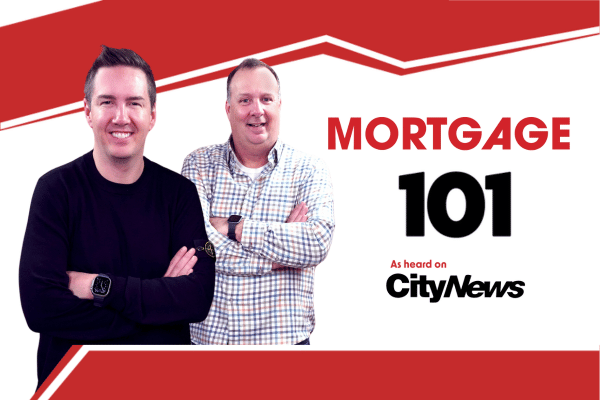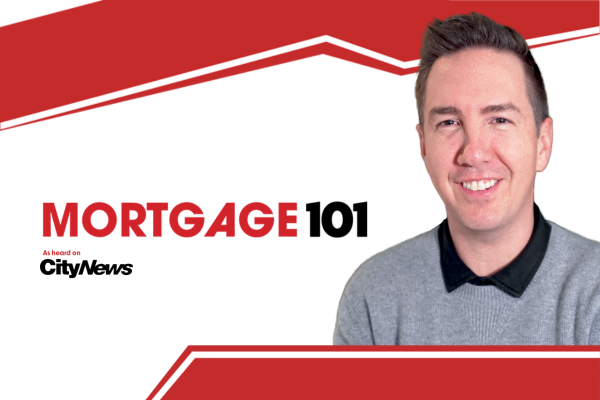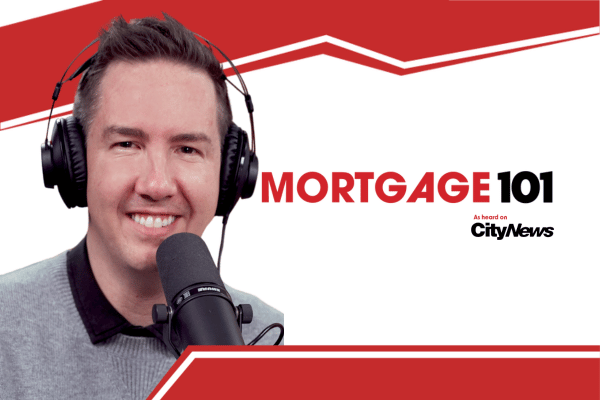Clinton Wilkins and Todd Veinotte are back this Spring to discuss the latest budget updates, including changes in mortgages and housing incentives. Plus, a debate between Beyonce and Dolly Parton country renditions and how the new housing incentives for new builds may expand the construction industry here in Nova Scotia!
Mortgage 101 – do I take a variable or fixed right now? | September 2022 Part 2
In this episode of Mortgage 101 with Clinton Wilkins and Todd Veinotte, as heard on CityNews 95.7 and CityNews 101.1, the guys talk about which type of rate is better for borrowers: variable or fixed. Find out which one will be better for your situation as the two dive into topics like which rate is easier to qualify for, which rate will cost borrowers more money, what happens if you need to break your mortgage early and the difference between the two types of variable rate mortgages.
Mortgage 101 with Clinton Wilkins & Todd Veinotte: Do I take a variable or a fixed right now?
Don’t feel like watching the video? Check out the transcript below.
Transcript:
Is fixed rate the way to go right now?
Todd Veinotte: [00:00:00:07] All right. So let’s talk. Let’s drill down more into variable versus fixed because we kind of get into this when we started. And again, you have been consistently telling people variable mortgage.
Now, I recently had a conversation with the listener of the show and somebody who has a lot of respect for you, and he said, “Oh, by the way, Todd,” I was having breakfast with him. He said, “I think your mortgage guys got it wrong.” He said, “I’ve been listening to a podcast” and I can’t remember which one it was, but it was a national podcast. And he said, “and that mortgage guy that they had on said the opposite.” So he’s all convinced.
Clinton Wilkins: [00:00:32:21] That a fixed rates the way to go.
Todd Veinotte: [00:00:33:19] That’s right. He was he was like “your guy said it wrong!” So what do you, what’s your response to him?
Clinton Wilkins: [00:00:39:04] You know, I think it’s really personal opinion. I’ll tell you, there certainly a lot of pros for both and I mentioned this earlier, historically, 60% of Canadians are taking a fixed rate. The last couple of months, guess what percentage of Canadians are taking a variable? 70 to 75%.
Todd Veinotte: [00:00:57:18] Taking a variable?
Clinton Wilkins: [00:00:58:11] Correct. Do you want to know why?
Todd Veinotte: [00:01:01:00] Why?
Which rate is it easier to qualify for?
Clinton Wilkins: [00:01:02:08] Obviously it’s lower than the fixed and you’re qualifying on a lower rate. So when we qualify for a mortgage in Canada, we either use a stress test rate, let’s throw the stress test right away right now. We’re qualifying on 2% above the contract rate. So right now, kind of the best variable that we can get out there in the market is somewhere around prime -95 basis points, if you’re doing a high ratio insured mortgage. So you’re looking at a rate at 4.5.
So that means that you’re going to qualify on a rate of 6.5. Obviously, that’s attractive. A lot of fixed rates today are anywhere from maybe close to where the variable is, let’s say, 4.59%, upwards of 5.25%, 5.5%. So if you do take that fixed rate, you need to qualify on a rate that is 200 basis points, so 2% above your contract. So it is more prohibitive today to get a fixed rate than it is a variable in terms of qualifying. So obviously that is part of the reason. That’s not all the reason, but that’s part of it, Todd.
The other reason that 70 or 75% of Canadians have been taking a variable rate as of late is the spread between where the fixed rate is and where the variable is has been quite dramatic. So the variable has been much, much lower than where the fixed is right now. And a lot of Canadians think the fixed rates are kind of at the peak.
Will a variable or fixed rate cost me more money?
Clinton Wilkins: [00:02:26:00] And I said good fixed rate on a high ratio insured mortgage is 4.59. But not everyone is doing a high ratio insured mortgage and not everyone’s doing maybe a transfer to another lender. A lot of people are doing a conventional mortgage or maybe a refinance, and those customers are getting a rate, you know, in the low to mid 5% range.
The thing is with taking a fixed rate, that’s a fixed rate for the period of time. And if you do break your fixed rate early, you’re either going to pay three months interest, like you would if you broke a variable, or an interest rate differential. And typically, if you take a fixed rate from a bank lender, like the big five and if you break that fixed rate mortgage early, you will typically pay quite a substantial penalty if there is an interest rate differential. And what an interest rate differential means, it’s a spread between what you borrowed and sometimes taking into consideration your discount and then what that lender can sell your mortgage back to another consumer for.
What happens when you break your mortgage early?
So right now, you know, some people are breaking their mortgages and they’re at some low rates. They’re only paying three months interest, but I will bet you: if you take a fixed rate today and let’s say 5%, and you want to break it in a couple of years when the rates go down? Big, big, big, big money. And a lot of things happen in people’s life, Todd. There was a stat, and this is an old stat, and maybe the stat is true today, maybe it’s not. But Canadians typically break their mortgage somewhere in the 40 to 50 month range. They’re not living through five years.
Todd Veinotte: [00:03:59:10] You say, “typically.” What are you talking there? Are you talking one out of two? Are you talking five? And like, what’s the number?
Clinton Wilkins: [00:04:04:14] The average. If we look at the average at 100%. So let’s say we average 100% of Canadians that have a mortgage, a big percentage of them are breaking the mortgage early. Big. So if you break your mortgage early in a variable, it’s only three month’s interest.
Todd Veinotte: [00:04:18:19] But maybe they wouldn’t, right? Maybe people are breaking their mortgage because they can.
Clinton Wilkins: [00:04:23:14] Yeah, that is, that could be true. And maybe those stats are going to go down. The other thing that I want to say is with a variable rate, you can convert it into a fixed. Let’s say the fixed rates go down when the Bank of Canada starts softening the key overnight rate.
Now, they do not move concurrently, so let’s take that out of our minds. But let’s say the fixed rates go down. You know, at one point during the pandemic fixed rates were at like 1.5% Percent or 2 per cent. What happens at the fixed rates go back down there and you have a five year fixed and it’s at 5%.
Todd Veinotte: [00:04:56:13] You can’t move.
Clinton Wilkins: [00:04:57:07] You’re stuck. And a lot of things change in people’s lives. That’s what I really want to kind of bring attention to. You know, there’s a lot of reasons why people break their mortgage early, Todd. I’m kind of joking, you know, at 40 or 50 months that that’s the average, but it’s really kind of true.
People go through health issues. People have job loss. People have matrimonial breakdown. I feel like I’m talking about you. I don’t even know. They have loss of business. There’s a lot of reasons why people break their mortgage early. And, you know, I think that’s something really important to think about when you have a fixed rate, it’s a contract and you’re really stuck with it. And I believe fixed rates are very high right now. Customers tell me.
Variable rates do just that: They vary
We remember these days where it was like rock bottom. What’s changed, though, is the Bank of Canada met last week. As you know, they did a 75 basis point increase. We talked a little bit about inflation in our last segment and now the variable rates and the fixed rates are almost the same. So what is better for you? It’s really now more a lifestyle choice.
Clinton Wilkins: [00:06:04:18] Do we think the Bank of Canada is going to continue to increase the overnight rate? They may have they gotten it right with their last 100 basis point increase. 75 basis point increase. We will see what happens with inflation. Do we think fixed rates are at the ceiling? They could be. It really has to be determined by what happens with the bond and the bond yields. So there are some uncertainties. And the one thing that I do know is, historically, borrowers do better in a variable. Historically. And we’re talking going back to the 1980s. Historically, borrowers have done better in a variable rate. But the one thing that you need to remember when you’re in a variable, is it can vary.
It’s going to go up and it’s going to go down and you need to be able to stomach that. Now, one thing I should bring to your attention and one thing that’s really been a hot topic: there are two different types of variable mortgages. There is a traditional variable mortgage that’s typically had by the big five. Now not all of the big five, but most of the big five have this type of mortgage.
Clinton Wilkins: [00:07:05:19] When the prime rate goes up, your payment does not change. It extends your amortisation. If the prime rate goes down it reduces your amortisation and pays off the mortgage faster. Those types of mortgages are not as popular in a raising rate environment. The reason being is Canadians really want to pay down their debt.
Todd Veinotte: [00:07:23:01] Yeah.
Two different types of variable rates: traditional and adjustable
Clinton Wilkins: [00:07:23:28] The bulk of the other lenders that are out there in the marketplace, including some in the big five, have what we call an adjustable payment. So the payment goes up and the payment goes down if the prime rate changes. And those are more popular because your amortisation stays in line and it kind of protects you for the future. And before the show we were kind of spitballing and kind of joking around a little bit and I said, “I’m not worried about people on a variable.” I’m not saying that exclusively that. I’m not worried about people in a variable, but those aren’t the people that keep me up at night.
The people that keep me up at night are the people that got a mortgage three, four, four and a half years ago at very low interest rates that are now coming up and are up for renewal at fixed rates that are like 5%, because those people are not ready. Those people are going to have a payment shock and those people are going to have a rude awakening when they get those renewal offers in the mail.
Todd Veinotte: [00:08:17:16] Yeah, I think it’s interesting how, and I hadn’t really thought of it, but yeah, if you’ve got a variable at any point, you can convert that
Clinton Wilkins: [00:08:25:14] No penalty!
Todd Veinotte: [00:08:25:25] So there’s almost no risk here to have a variable.
Clinton Wilkins: [00:08:28:02] I believe, is the lowest risk. And of course, we’re going to have the people that say, “Well, if I took a fixed rate a year ago it would be lower.” Yes. Do we have a crystal ball? No. Is the variable still going to be lower over the term of your mortgage? It very well could be, Todd.
If we’re in a recession situation at the end of next year, we could be really in very good shape. So I guess we’re going to have to wait and see and see what happens.
If you have any questions, get in touch with us at Clinton Wilkins Mortgage Team! You can call us at (902) 482-2770 or contact us here.


